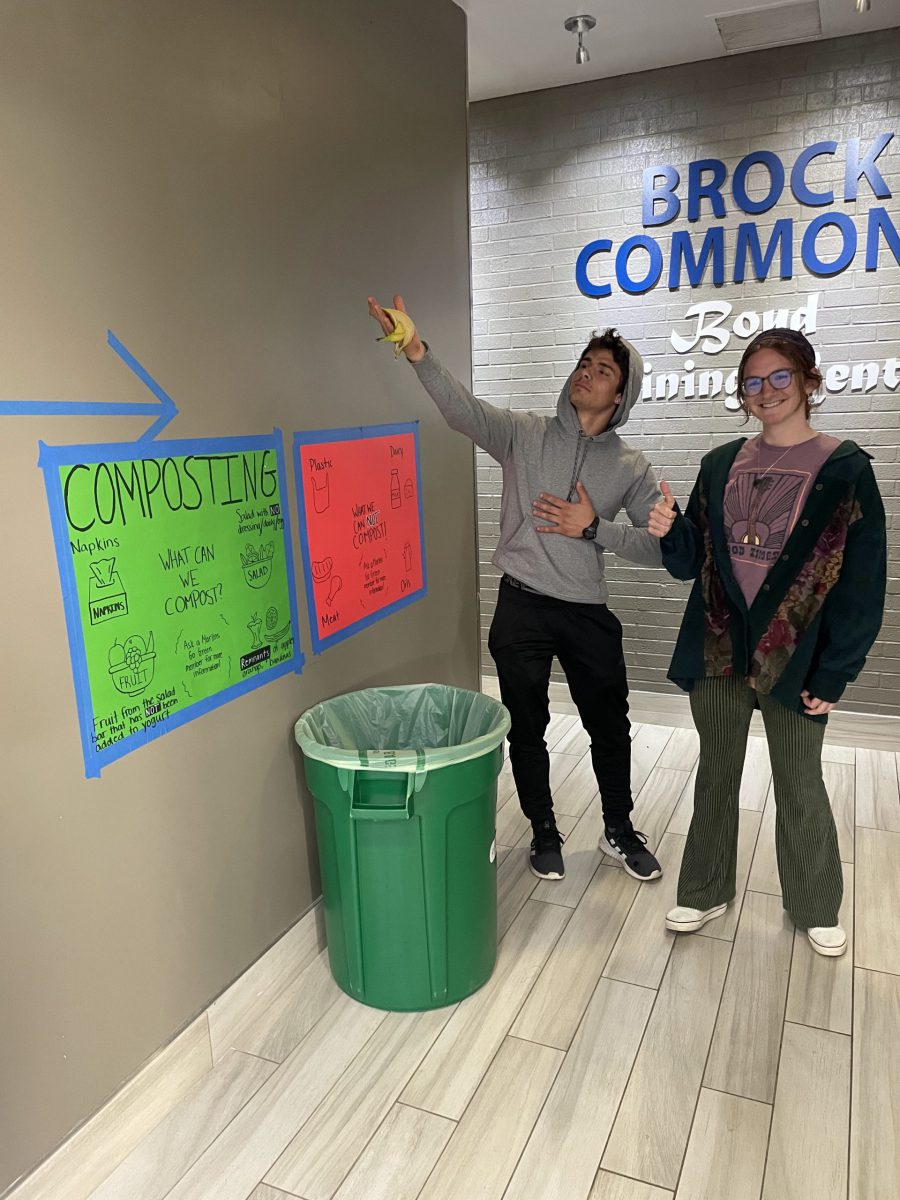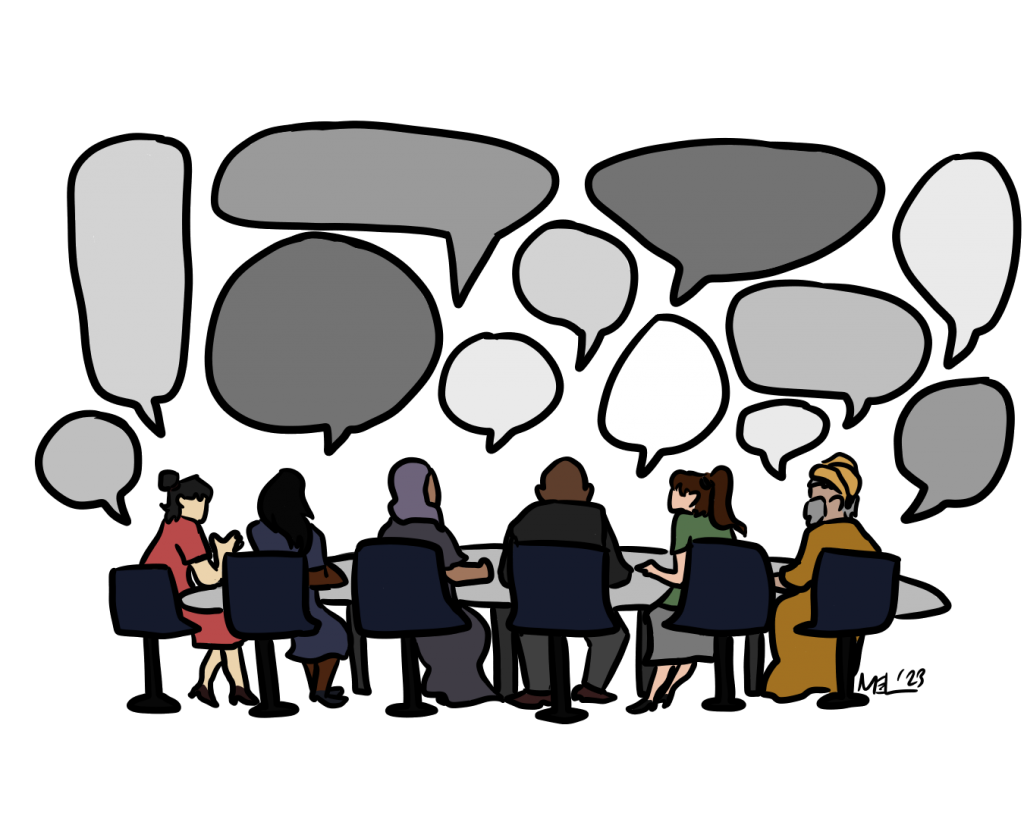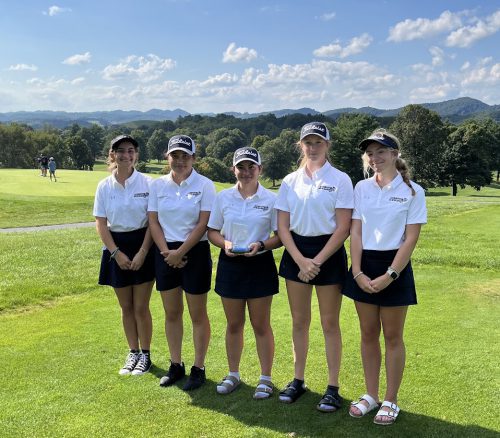Featured Image: Senior Garrett Page and sophomore Kaitlyn Duswalt
guide consumers through the composting process. Lily Reslink | Marlin Chronicle
After much trial and error, a campus-wide composting initiative has come to fruition through a joint effort between VWU community members.
The addition consists mainly of dining hall food waste collection, but extends beyond to practices such as collecting the grounds produced by the Lighthouse’s daily coffee service.
The implementation most visible to students is the bin now located in Boyd Dining Hall.
Senior Abigail Mahoney set the ball rolling for the project by choosing to do her Senior Seminar project on food waste in regards to UN Sustainable Development Goal 13, but she was quick to point to the others that made the initiative a reality.
“It definitely was a team effort with regards to the implementation of this compost bin,” Mahoney said.
As pillars of this project, Mahoney mentioned Tim Lockett, the general manager of Sodexo Dining Services on campus, Skyler Lattuca, a recent VWU graduate and current horticulturist of VWU’s Greer Gardens and Jessica Wilson, the vice president of Marlins Go Green.
Marlins Go Green (MGG) is a student organization at VWU with the intention of “making strides for awareness and sustainability through education, activism, and volunteer opportunities,” as written in their Instagram bio. The organization has been integral to the project’s funding and coordination.
Although the compost bin technically already made its dining hall debut on March 1, the results were less than ideal.
“The hardest part, truthfully, is working to get students to follow the directions on the sign,” Mahoney said, noting that it took less than 30 minutes for dairy to end up in the bin.
To ensure a smoother operation for the compost, Mahoney said, “We are working now on bringing on some volunteers to help the students on campus transition into using the compost bin.”
As of dinner time on March 20, the compost bin was put back in the dining hall for student use under close supervision of volunteers.
Sophomore Jessica Wilson, executive member of MGG, echoed Mahoney’s logistical explanation. “For the first few days, MGG members will be helping educate students on what they can and can not compost,” Wilson said.
Leading up to the bin’s reintroduction, MGG focused on educating the student body on composting practice through platforms such as Instagram. “It is crucial for students to pay attention to what they put in the compost bin for this program to remain successful,” Wilson said.
For reference, compostable items include the remnants of fruit and vegetables, as long as they are uncontaminated by animal products such as meat, dairy and eggs. An example would be banana peels, apple cores or leftover veggies that have not had dressing on them.

Getting the composting system to its current point of operation took contributions from several other team members.
Having been the former president of MGG, Skyler Lattuca possessed all the necessary background to play an indispensable role in making the compost bins possible.
According to Lattuca, preparing for this required a strenuous combination of both hands-on work and community training. “The new composting system was built by me and one of my interns Eric O’Dea, and has two different sources: food waste accumulated as a result of the preparation of meals in the dining hall and post production food waste from the dining hall.”
Lattuca said, “The major difference between the two is that the latter requires a lot more education, as the students need to know what parts of their meals are and are not compostable to avoid contamination.” On the contrary, Lattuca said it was much easier to educate the few individuals responsible for food prep.
With so many moving parts, Lattuca highlighted the importance of liaisons in various sectors. “When implementing projects like this, there are often many different parties involved that don’t usually work together, which requires a lot of flexibility and adaptation. In my position, I have little communication with, for example, the dining hall staff,” Lattuca said.
Due to this, he pointed out the necessity of students like Wilson and Mahoney to “facilitate that communication and create a plan based on the abilities of both of our departments.”
“Beyond that, having an individual to maintain a project long-term is probably the biggest obstacle to any student-planned project,” Lattuca said. His position will alleviate this challenge by removing the dependence on the revolving door of students.
“As much as we’d love to believe that incoming students will be passionate enough to fulfill roles that graduating students occupy, that is not a source that can be relied on when proposing these projects. In this case, my role as a full-time employee on campus has been useful to take on that responsibility,” Lattuca said.
Despite only now achieving dining hall composting from the student side, Wilson said this is far from a new idea. “I have heard from current senior Marlins Go Green members that the composting initiative has been attempted many times prior to their time, but they could not achieve faculty support until now,” Wilson said. “Over this past year I have heard composting being discussed all over campus.”
Lattuca explained that VWU even had a successful composting system at one point, run by former Professor Phillip Rock before his recent retirement.
“The original bins were mostly kept a secret, known only to my interns and a few of his students, as they were difficult to utilize and access,” Lattuca said. When Lattuca took on responsibility for those bins, he hoped to make some upgrades. This includes expanding their capacity and reducing the need for maintenance through a stackable design.
The current system is as follows: Once collected, Lattuca said the food waste from the dining hall moves to a tower of earth-worm filled compost bins.
“Each tower is made of 4 stackable compost bins, each with a wire mesh bottom that allows the worms to travel between the bins while still containing the food waste. The theory here is that the worms will slowly consume the food at the bottom of the tower and work their way upwards, digesting the food waste and producing vermicompost: a more nutrient-rich version of standard compost,” Lattuca said.
“This process was chosen because it is more compact and faster than standard composting, which can take upwards of 2 months to break down food waste in comparison to the 2 weeks that our bins can do it in,” Lattuca said.
Wilson emphasized the importance of composting given its environmental implications. “Landfills do not allow food waste to properly decompose because it is deprived of oxygen. Under these conditions, the food waste generates methane, a greenhouse gas that is 27-30 times more powerful than carbon dioxide over a 100 year period.”
Alternatively, Wilson said that composting food waste “creates nutrient rich fertilizer with less emissions that can be used on campus or sold in the community.”
Wilson said a part of why this project is exciting to her is because it shows faculty members’ openness to student-led initiatives.
For any students looking to pursue campus projects of their own, Lattuca shared three tips. First was to “Find an employee willing to oversee/maintain the project long term.”
Second was to “Consider your stakeholders.” For this, he encouraged the questions of “Who will this project affect? Who is needed for this project to succeed?” Make sure these parties are informed and on-board with your idea.
Third was “Utilize the EES Endowed Fund offered every fall semester to propose your idea. It’s free money offered to students willing to propose sustainable projects.”
He added, “This resource alone can make your project idea a reality, so long as you take the time to do your research and iron out any potential issues.”
Mahoney wanted students to know that acquiring the needed support doesn’t have to be a roadblock to seeing their ideas realized.
“I know approaching people, especially authority figures, can be daunting but I genuinely think most faculty on this campus are willing to work with students. After all, our success reflects positively on them,” Mahoney said.
By Lily Reslink
lbreslink@vwu.edu


